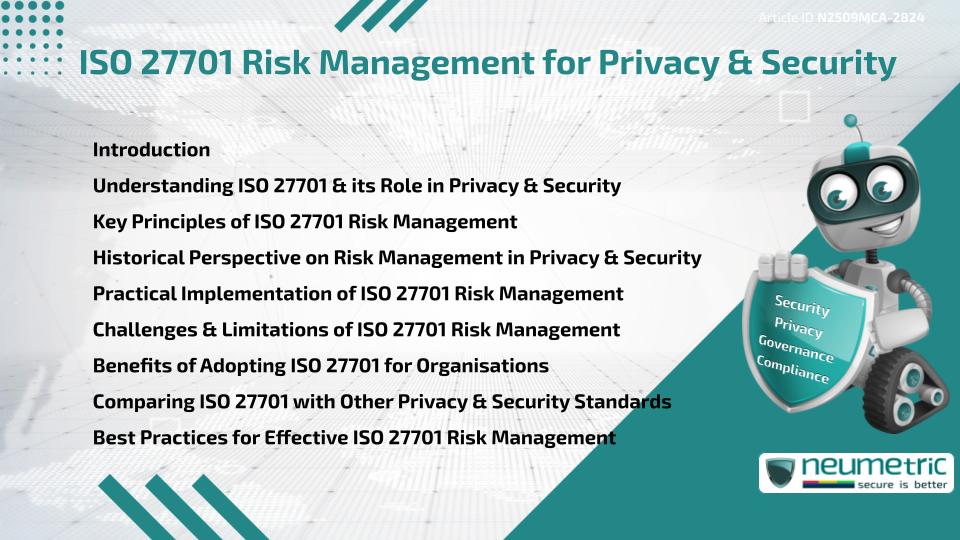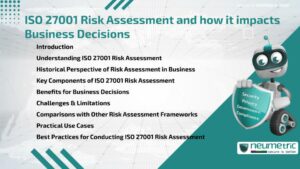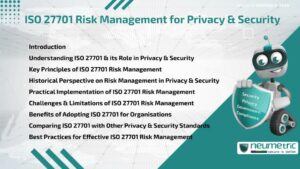Table of Contents
ToggleIntroduction
ISO 27701 Risk Management is a Framework designed to help Organisations handle Privacy & Security Risks effectively. It builds upon ISO 27001 & ISO 27002 by extending controls to include Personal Data Protection. This Standard helps companies align with global Privacy laws such as the General Data Protection Regulation [GDPR]. By using it, organisations can identify, assess & manage Privacy-related Risks alongside security challenges. The approach combines Compliance with Accountability, ensuring that businesses not only protect Sensitive Information but also maintain Trust with Stakeholders.
Understanding ISO 27701 & its Role in Privacy & Security
ISO 27701 extends the Information Security Management System [ISMS] to cover Privacy-specific Risks. While ISO 27001 focuses on Security, ISO 27701 introduces controls tailored for Data Protection. This integration makes it valuable for Organisations managing Personal Data, from Healthcare to Finance. By adopting this Framework, companies can demonstrate Compliance with Legal requirements & strengthen their Privacy posture.
Key Principles of ISO 27701 Risk Management
The main principles of ISO 27701 Risk Management include Accountability, Transparency & Proportionality. Accountability ensures Organisations are responsible for protecting Personal Data. Transparency helps build Trust by making Privacy Policies clear to individuals. Proportionality ensures that the level of protection matches the level of Risk. Together, these principles create a balanced approach to Privacy & Security.
Historical Perspective on Risk Management in Privacy & Security
Risk Management in Privacy & Security has evolved significantly. Earlier, organisations relied on technical measures such as Firewalls & Encryption. Over time, laws like GDPR & the California Consumer Privacy Act [CCPA] reshaped the way companies approach Data Protection. ISO 27701 emerged as a structured response, offering international guidance to manage Privacy Risks consistently. It provides organisations with a bridge between historical Security Measures & modern Legal demands.
Practical Implementation of ISO 27701 Risk Management
Applying ISO 27701 Risk Management requires several steps. Organisations begin with a Risk Assessment to identify Vulnerabilities in Data Handling. Next, they map data flows to understand how Personal Information is collected, processed & stored. Once identified, Risks are evaluated & treated using controls outlined in ISO 27701. Training Employees, monitoring Compliance & reviewing Policies are also key components. Analogous to maintaining a safe building, this system requires regular inspection & reinforcement.
Challenges & Limitations of ISO 27701 Risk Management
While ISO 27701 offers many advantages, it also has challenges. Implementing the Framework can be resource-intensive, especially for small Organisations. It requires expertise in both Security & Privacy, which may not always be available. Another limitation is that Compliance with ISO 27701 does not guarantee Compliance with all regional Privacy laws. Organisations must still adapt to specific local requirements.
Benefits of Adopting ISO 27701 for Organisations
The adoption of ISO 27701 Risk Management offers multiple benefits. It enhances Compliance with global Privacy laws, reduces Risks of Data Breaches & improves organisational Reputation. Customers & Stakeholders gain confidence knowing that Personal Data is handled responsibly. Internally, the Framework helps streamline processes & clarifies roles related to Data Protection. For Organisations in highly regulated sectors, these benefits translate into competitive advantages.
Comparing ISO 27701 with Other Privacy & Security Standards
ISO 27701 is not the only Framework addressing Privacy & Security. Standards like NIST Privacy Framework & SOC 2 also provide guidance. However, ISO 27701 is unique because it integrates directly with ISO 27001, making it practical for Organisations already certified in security management. Unlike others, it combines both Security & Privacy, reducing duplication of efforts & offering a comprehensive approach.
Best Practices for Effective ISO 27701 Risk Management
Organisations can strengthen their ISO 27701 Risk Management practices by following Best Practices. These include conducting regular Audits, involving Senior Management in decision-making & ensuring Continuous Training for staff. Establishing clear documentation & using automation tools to monitor Compliance also helps. Just as routine maintenance ensures the reliability of machinery, regular reviews & updates keep the system resilient against new Threats.
Conclusion
ISO 27701 Risk Management serves as a vital tool for Organisations seeking to integrate Privacy & Security under a unified Framework. By balancing Accountability, Transparency & Proportionality, it allows businesses to manage Risks effectively while meeting Regulatory demands.
Takeaways
- ISO 27701 extends ISO 27001 to cover Privacy-related Risks.
- It emphasises Accountability, Transparency & Proportionality.
- Implementation requires structured Risk Assessment & Monitoring.
- Challenges include costs & adapting to regional laws.
- Benefits range from Compliance to reputation & competitive edge.
FAQ
What is ISO 27701 Risk Management?
It is a Framework that integrates Privacy controls into Security Management systems to help Organisations manage Personal Data responsibly.
How does ISO 27701 differ from ISO 27001?
ISO 27001 focuses on Information Security, while ISO 27701 adds controls for Personal Data Privacy, making it more comprehensive.
Does ISO 27701 guarantee compliance with laws like GDPR?
No, it helps align practices with laws like GDPR but Organisations still need to address specific local Legal requirements.
What industries benefit most from ISO 27701?
Industries handling large amounts of Personal Data, such as Healthcare, Finance & Technology, benefit the most.
Is ISO 27701 difficult to implement?
Implementation can be challenging due to resource & expertise needs, but it becomes manageable with structured planning.
Can Small Businesses adopt ISO 27701?
Yes, but Small Businesses may face higher costs relative to their size, so they should weigh the benefits against the investment.
How does ISO 27701 build trust with Customers?
By demonstrating Accountability & Transparency in handling Personal Data, it reassures Customers that their information is safe.
Need help for Security, Privacy, Governance & VAPT?
Neumetric provides organisations the necessary help to achieve their Cybersecurity, Compliance, Governance, Privacy, Certifications & Pentesting needs.
Organisations & Businesses, specifically those which provide SaaS & AI Solutions in the Fintech, BFSI & other regulated sectors, usually need a Cybersecurity Partner for meeting & maintaining the ongoing Security & Privacy needs & requirements of their Enterprise Clients & Privacy conscious Customers.
SOC 2, ISO 27001, ISO 42001, NIST, HIPAA, HECVAT, EU GDPR are some of the Frameworks that are served by Fusion – a SaaS, multimodular, multitenant, centralised, automated, Cybersecurity & Compliance Management system.
Neumetric also provides Expert Services for technical security which covers VAPT for Web Applications, APIs, iOS & Android Mobile Apps, Security Testing for AWS & other Cloud Environments & Cloud Infrastructure & other similar scopes.
Reach out to us by Email or filling out the Contact Form…





